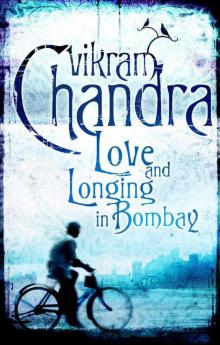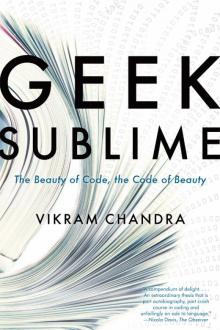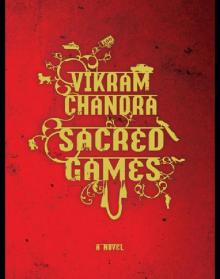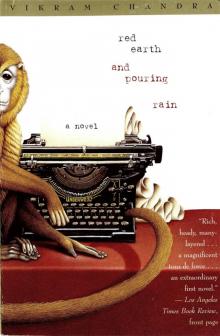- Home
- Vikram Chandra
Red Earth and Pouring Rain Page 19
Red Earth and Pouring Rain Read online
Page 19
So when they had finished the old man dropped the spoon into the cloth, took up the four corners of the muslin, and tied up a neat little bundle for me. ‘Here,’ he said, ‘tell her to eat each of these one by one, to place them in her mouth whole, and she will have sons.’ ‘Yes,’ I said. ‘Yes,’ Thomas said, ‘tell her to eat them, and she will have sons worthy of her.’ ‘And you, Jahaj Jung?’ I said. ‘I will stay here,’ he said. ‘Then,’ I said, ‘I will sit here in a corner, with your sons in my lap, and I will watch the combat.’
They crouched and circled each other, pawing occasionally at each other, and I saw instantly that the old man had learnt at one of the flashier schools of Western Avadh —he hooked with the insteps and lunged no less than five or six feet without warning —very quick and very dangerous; Thomas hung back and defended, hesitant, unsettled by the absence of weapons, the smacking impact of flesh, and, no doubt, by the unfamiliar flapping of the clothes he wore; under the old man’s attack, he retreated, giving ground quickly, never staying in one place, rolling under the blows, accepting the pain, and this I promise you —I saw him learn, I observed him taking each blow as a lesson, an instruction in the inevitable laws of skill and strength and power, of domination and subservience, in that hideous association of the ruler and the ruled.
The old man, losing his patience, lunged again, over-extending his forward leg, reaching; Thomas grasped his wrist and fell over backwards, pulling, taking the old man on top of him, and quick, quick, he whirled, slid, was up, the old man rolled onto his back and Thomas stamped with his foot, coming down just above the old man’s groin, then took a step, a stride, and the other foot crunched into the chest; he stood there, for a moment, legs frozen in mid-pace, balanced on the other, and the old man laughed, wheezing, ‘I think you have beaten me.’
Thomas stepped off him, stumbling a little, and the old man curled up, holding himself, trying to breathe. After a while, he pushed himself up and beckoned to the lions, and resting a hand on their shoulders, walked slowly towards the edge of the city. Thomas watched him go in silence.
‘Who was he?’ I said. But then we heard the lions roar, and Thomas was staring off into the wilderness, and he said nothing at all.
Thomas and I walked up back to camp, and seeing us coming, the rest broke into cheers and applause, because they knew that if he came back he must be victorious. ‘Victory to Jahaj Jung,’ they shouted. ‘Jahaj Jung will live forever.’ But Begum Sumroo came straight up to me and asked what the old man had done about my problem, and I told her about the laddoos. ‘Let me see them,’ she said; I told her what the old man had said about being careful, but she said, ‘Let me see them.’ Her husband was skulking around, with his soldiers not far away, so I gave her the laddoos. She lifted them from the muslin, one by one, and held them up, examining them very closely, sniffing at them, then laying them back. ‘What is it?’ I asked. ‘How does it work?’ ‘I don’t know,’ she said. ‘I don’t.’
The next morning I put my bundle in a saddle-bag, and said goodbye to Thomas and his men, who were already preoccupied with their city, with reconstruction and habitation and immigration. So I rode off, bearing as nearly south as I could, keeping to the big roads, and joining caravans when I could find them, but one evening, in that region where the clustered green trees of Braj shade off into the brown scrub of Rajputana, I was riding alone, trying to make it to the next serai before darkness fell, when I rode into an infantry column’s out-lying cavalry picquets.
Yes, I admit I was careless, I should have heard them, I should have paid attention to the sudden alarmed chirping of birds, I should have known, but perhaps it was the moon, fat on the horizon, or the purple of the twilight; I was careless, I was dreaming, they caught me. When I saw them I thought it better not to run, and so there was no unpleasantness —they took me back to the column, and when I saw the infantrymen’s faces, their regular synchronized marching stride, that empty look (straight ahead, always straight ahead), the speed with which they thumped across the country-side, I knew it was the Chiria Fauj, and sure enough, as we rode along the road-side, there was a call from a palanquin borne by six men on each side, and six walking behind, ready to relieve. One of the cavalrymen turned to me, and said, ‘Be respectful, now, fool-who-rides-in-the-night. You are about to meet the general of generals, the conqueror of armies, the master of Hindustan: General de Boigne.’
I muttered under my breath, The puppet-master himself, and his straw-headed doll-soldiers’ and the cavalryman half-turned in his saddle, and there might have been some unpleasantness after all, but the man in the palanquin called again, ‘What is it?’ The cavalrymen explained, and de Boigne —yes, it was him —said, check him, check his saddle-bags.
They found the bundle and opened it, and the laddoos shone. They handed up the bundle to de Boigne, holding the muslin by the edges, and he asked, ‘What is this?’ His face was swollen, and rolls of fat bulged out of his shirt as he lay in the palanquin, huge and slow-moving; I told him that it was blessed parsad from a sacrifice conducted by an old man, which I was taking back to my home-town for my friends and relatives. ‘Holy food? Really? A holy old man?’ I nodded. He reached in and picked up a laddoo. ‘Don’t touch them,’ I blurted. He raised an eyebrow, then picked each one in turn, rolling it about the palm of his hand. ‘Don’t,’ I said, and he smiled. ‘I make kings,’ he said, and tightened his fingers about the laddoo he was holding in his hand until it crumbled and fell piece by piece into the cloth, its glow dying swiftly.
I said nothing; he sat up, rubbing his fingers against each other, and looking at me he spat into the muslin, carefully, one tear-shaped glob of spittle for each of the laddoos. I stayed still. ‘Let him go,’ de Boigne said; ‘they’re obviously nothing important.’ He threw the bundle to the ground just as somebody else dropped me to the ground with a single neat blow to the back of my neck; on my hands and knees I scrambled to the side of the road, over the deep ruts, dragging the bundle behind me. I knelt over the laddoos, trying to reform the broken one, pressing the little balls together, attempting to stick them together like clay, but nothing I did could bring the glow back, and —I tried to stop it, but I couldn’t, and I too touched them —the tears of my rage fell on them, on the sons that were not yet born, and the infantry and the cavalry and the artillery and the engineers tramped on by, raising a fog of dust that covered everything. I threw the remains of the broken one by the roadside, tied up the bundle, and set off again. The days passed, and finally, I appeared again in that garden, and the rest you know.
‘Yes. She and my sister ate the laddoos, and they were born.’
‘Your sister too?’
‘It hurt to eat them. She gave my sister one, and my nephew was born at the same time as Sikander, two years after the day he was conceived.’
‘I heard about the two years.’
‘And we all touched the laddoos, in one way or the other.’
‘Yes. The old man, Thomas, Begum Sumroo, I, de Boigne, you, all of us. All of us except the fathers.’
‘Yes.’
‘I thought of this, after I had given her the laddoos,’ Uday Singh said. ‘And I suppose it was for this reason that I counted the days after that morning, and had my spies hovering about your house, disguised as fruit-wallahs and beggars and gipsy children. But despite all this I had no idea the first one had been born until Skinner announced it in court; later, my men got hold of the midwife, and I heard of how he had been delivered, and what he looked like. And again I counted days, and this time my servants heard the shrieks, and I disguised myself as a watchman, with a dog, and I went and listened outside your garden wall. The night passed in the screaming, but when the moment came I knew, and I couldn’t understand why I thought I knew.
‘Maybe it was the two years of your sister’s pregnancy, and maybe it was the memory of the old man and Thomas, and everything that had happened, but I was expecting comets to fly across the sky, and the braying of donkeys, and wailing in
the heavens; I thought cows would give birth to asses, and blood would drip from the air, and ghosts would clang shields and swords in the streets; but nothing happened. I knew it was the moment because the whole world died away, because there was not a sound to be heard anywhere, nothing; there was just the quietness; I knew it then but later I thought no, it was nothing, it was just that the screaming had stopped.’
‘But I saw the king-cobra today.’
‘You did.’
‘I did.’
Uday looked away, then back at Ram Mohan. ‘Do you really think,’ he said, ‘that Sikander will be a king, an emperor?’
‘I don’t know,’ Ram Mohan said. ‘I must go, back to them.’
‘Yes.’
When the bearers had picked up the palanquin and were already jogging away, Ram Mohan poked his head out and looked back at Uday Singh. ‘Why was the cobra weeping?’ he said.
Uday shook his head; the bearers chanted ‘Hu-hu-hu-hu-hu-hu’ over the crickets; the moon skimmed low over the tree-tops above; Ram Mohan lay back on the wood, exhausted, feeling the hardness of the earth on each step in his hip, in the place where the bone fused and remained stubbornly still; and the sweat dripped from his chest, smothering him with its rankness, but despite everything he fought down a fierce exultation that made him want to shout, ‘I have sons,’ because now all pain seemed unreal, all insults would be avenged, all possibilities seemed to exist, renewed, all death was defeated: I am the father of Sikander, the king; I am the mother of Chotta Sikander, the prince; I am the parent of Sanjay, the poet; I will never die.
Sandeep called:
HERE ENDS THE FIRST BOOK,
THE BOOK OF WAR AND ANCESTORS.
SIKANDER IS BORN.
NOW BEGINS THE SECOND BOOK,
THE BOOK OF LEARNING AND DESOLATION.
THE BOOK OF LEARNING AND DESOLATION
now
‘SNAKES?’ Abhay said. ‘Cobras?’ He raised an eyebrow, smiling.
‘You be quiet, bhaiya,’ Saira said, plopping herself down next to me. ‘How can you have a big story without a snake in it?’
‘Exactly’ I scribbled at Abhay.
‘And they liked it out there,’ Saira said, with a big sweep of her arm.
‘They did?’
‘Yes. And there’s a lot of them there. I’ve never seen so many people on our maidan before,’ she said, glowing with proprietary pride. ‘Come see.’
We went up on the roof and looked, and indeed there were a lot of people, filling up maybe half the maidan. I could see peanut-vendors working the crowd, and one enterprising fellow had already started an ice-gola stand under a tree, and he was playing film songs on a recorder. There were families bustling to and fro, and young boys on bicycles swooping through the clusters of people.
‘Come on,’ Saira said. ‘Interval’s over.’
As we came down the stairs the children in the court-yard were chanting, ‘Where were we? Where were we?’ Abhay’s two young friends with the questions about America were planted firmly in the front row.
‘Where we were,’ Abhay said, ‘was at a party, and then grieving for a death. Our consolations on a mountain-side were lit by the unearthly light of a thousand suns, the destroyer of worlds, by the fear in our hearts.’
Abhay began to type.
I passed a note to Saira: ‘Is that line his own or is he stealing from somewhere?’
She hissed at me in a loud whisper: ‘Oof! Of course it’s a quotation. Didn’t they teach you anything at school?’
What We Learned at School.
KATE KILLED HERSELF that night. Sometime before the sun rose, she dissolved three bottlefuls of sleeping pills in water, in one of her two fluted champagne glasses, and sitting at her desk, took little sips, washing it down with bourbon. She wore a long black skirt, a white blouse, and a string of white pearls. The sergeant who questioned me at the Claremont police station told me they found her with her hands folded in front of her on the table, the smooth blond hair falling over her face like a curtain. The glasses and the bottles were arranged neatly in two lines to the left. Everything was in order, except for her stockinged left foot, which had slipped out of her black shoe. Under the foot, there was a sheet of heavy white paper, with a few words in her fountain-penned, curlicued writing: “Abhay, just another, tiresome suicide note.” And that was it; there was nothing else.
The sergeant who questioned me —I forget his name —was a big black man with heavy shoulders. They called me in and sat me down in a brightly lit room with brown carpets and plastic furniture. There was that sharp light that comes from fluorescence, and I squinted my eyes, feeling like I was peering through a porthole at the world. I sipped at a cup of bitter coffee and thought about what she could have wanted to put into that white space, what reasons for dying she could have possibly set down into the emptiness under my name, why she stopped writing. I wondered if she had seen the flash outside, if that had silenced her before she could start explaining. Or if she had seen it, and then brought out the bourbon and the glasses.
“What time did it happen?” I asked the sergeant when he walked in and sat down, opening a manila folder.
“We don’t know yet,” he said. “They’ll do an autopsy sometime tomorrow. Are you doing all right?”
Somewhere, not far away, smoke rises from her skull as a fine-toothed electric hacksaw buzzes through the bone.
“Yes.”
“When did you see her last?”
“A couple of days ago. Tuesday, no, Wednesday night. At a party.” In her room, she poured red wine and went off to put in her diaphragm.
“And?” the sergeant said.
“We went home. I mean I went home with her. To her room, I mean.” On the way up to Scripps she tucked her hand under my elbow. I could feel her knuckles rubbing against my ribs, the softness of her sweater. Neither of us said anything till later in her room, when she said, I’ll just be a minute.
“Did she say or do anything that would’ve indicated that she was depressed? Unhappy?”
“No. I don’t think so.” I know that she had on a black bra. I know that she liked the tips of my fingers, very softly, across her shoulderblades. I know how her neck felt, taut, against my cheek, and how the sound that she made, finally, vibrated through my skin. I know I lay unable to sleep, staring at her wall, at the jagged collage she had made of pictures cut from fashion magazines, angular black-and-white people with the same cheekbones, all of them. This I know.
“Do you have any idea why she did it?”
“No.” No, I don’t. I am a victim of that boringly common ailment, sir, that malaise that cuts so many loose in a world overflowing with connections. For everything, they assure me, there is a cause, but I feel like I am floating, adrift. I don’t believe the sun will rise tomorrow. I don’t understand why the sky is blue.
“You have no idea?”
“No.”
“How often did you see her?”
“Once in a while. We weren’t, you know, seeing each other or anything like that.”
“What was the last thing she said to you?”
“She was on her way to class and she said she had three minutes left.”
“Three minutes?”
“Three and a half minutes.”
He stacked up his papers, laid his pen on top, and looked up at me. “Why did you come here? To this country?”
“For an education,” I said. “Of course.”
He nodded, and then he got up and walked down the hall. I sat alone in the room with its plastic chairs and tried to remember why I had come. I had lied: an education is how I had come, with scholarships and grants. What I had come for was something else. What was it? I tried to remember and all I could think of was one Saturday afternoon when we broke school bounds at Mayo to see the matinee at the Imperial. There were five of us who always went, crowded into the tonga and happy with the clip-clopping of the horse but terrified that there might be a master around the next corner.
The darkness of the theatre was a relief, and then, just before the movie, the manager always played a scratched, scraping record: ‘Tequila.’ I liked the Westerns best. That afternoon we watched The Magnificent Seven. Afterwards in the tonga homewards we were quiet, stunned, as if we were still watching the movie. Now the town of Ajmer, with the old mosque and even more ancient fort on the hill above, looked dirty and unreal and the bright afternoon sunlight hurt our eyes.
At that time, in ninth class, we were breaking bounds every week, and sometimes even during the week. I used to long for ‘Tequila.’ It was like being in love. That afternoon we kept the tonga going past the Main Building, with the statue of the founding British viceroy in front, past Ajmer House and Rajasthan House to the break in the boundary wall. We went over one after the other and I came last, and it was only after we were all in that we noticed Katiyar waiting in the shadows for us.

 Love and Longing in Bombay
Love and Longing in Bombay Geek Sublime
Geek Sublime Sacred Games
Sacred Games Red Earth and Pouring Rain
Red Earth and Pouring Rain